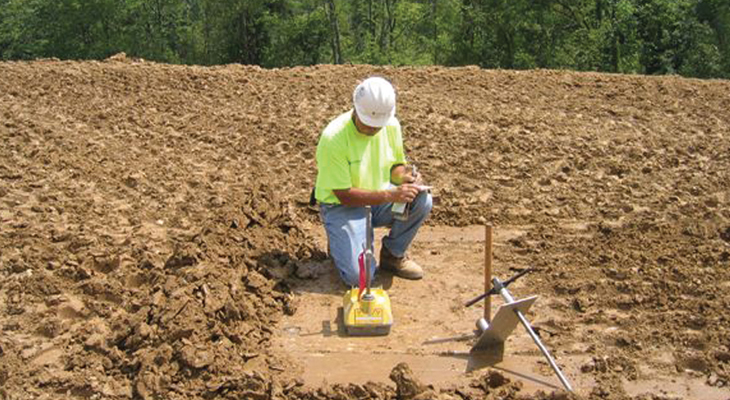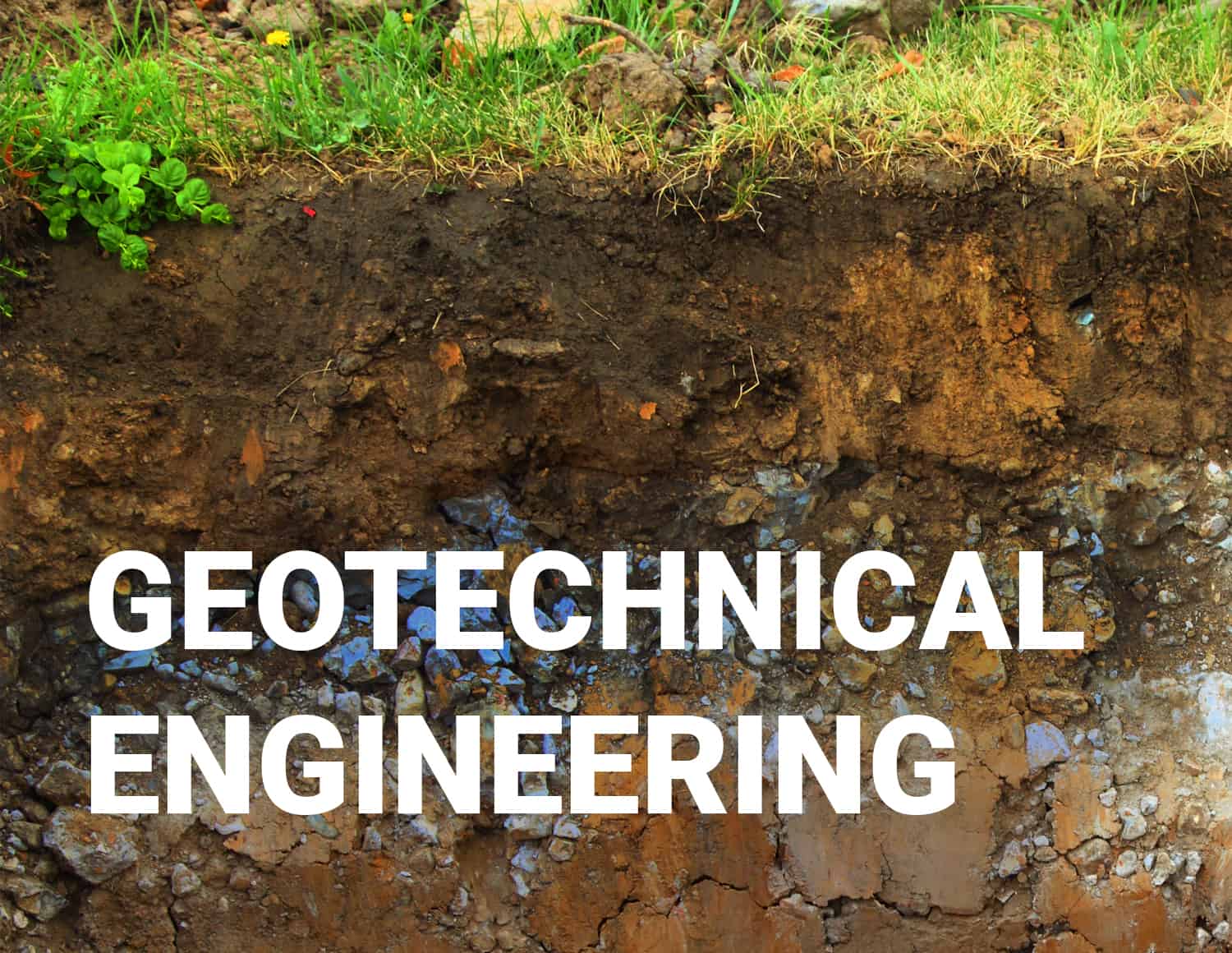Understanding the Fundamentals: Concerning Geotechnical Engineering in Modern Construction
Understanding the Fundamentals: Concerning Geotechnical Engineering in Modern Construction
Blog Article
The Value of Geotechnical Engineering in Attending To Environmental Challenges and Enhancing Construction Safety
Geotechnical engineering offers as a cornerstone in the junction of environmental stewardship and building and construction security, providing important insights into the actions of soil and rock under numerous conditions. By applying tactical site examinations and customized mitigation actions, geotechnical engineers play an essential function in protecting both human lives and eco-friendly integrity.

Function of Geotechnical Engineering
Geotechnical engineering plays a vital function in the design and building of infrastructure by dealing with the actions of dirt and rock products under different problems. This area of design is crucial for recognizing the communication in between structures and the ground, that includes figuring out the load-bearing capability of soil, evaluating stability, and forecasting possible negotiation or failure.
Geotechnical engineers are in charge of performing website investigations, which involve tasting and screening dirt and rock to collect data on their physical and chemical residential or commercial properties. This information is vital for creating foundations, retaining wall surfaces, and various other earth-retaining structures that make certain safety and security and durability. Geotechnical design informs the choice of appropriate building and construction techniques and materials, thus decreasing dangers linked with soil actions.
Furthermore, the combination of geotechnical design principles right into urban preparation and ecological administration is essential for dealing with obstacles such as ground contamination and groundwater management. By recognizing geotechnical factors, engineers can create lasting services that boost the resilience of facilities versus natural risks, while additionally promoting environmental stewardship. Inevitably, the role of geotechnical engineering is crucial for accomplishing secure, durable, and ecologically aware building and construction practices.
Soil Disintegration Mitigation
Soil erosion presents a substantial hazard to both environmental stability and infrastructure stability, influencing about 24 billion lots of productive dirt shed annually worldwide. This phenomenon is worsened by aspects such as logging, urbanization, and inadequate farming techniques. Geotechnical engineering plays a critical function in establishing effective soil erosion mitigation approaches that safeguard both the environment and building projects.
One method entails the implementation of disintegration control techniques such as plants planting, which supports dirt through root systems. Additionally, the building of preserving walls and terraces can effectively minimize surface area runoff and safeguard susceptible areas from disintegration. Correct water drainage style is likewise vital; it lessens water build-up and directs excess runoff far from important frameworks.
Moreover, geotechnical designers utilize soil stablizing strategies, such as the application of geotextiles and naturally degradable mats, to enhance soil communication and stop degradation - all about geotechnical engineering. Routine surveillance and analysis of erosion-prone sites make it possible for timely interventions, making certain long-lasting sustainability. By integrating these approaches, geotechnical engineering not just reduces the influences of soil disintegration however also adds to the durability of framework against ecological challenges, inevitably fostering a more secure and more lasting built atmosphere
Groundwater Defense Techniques
Groundwater acts as an essential resource for alcohol consumption water, farming, and industrial procedures, making its defense necessary for environmental sustainability and public health and wellness. Reliable groundwater security methods are crucial in alleviating contamination risks and making sure the longevity of this resource.

Routine surveillance of groundwater quality is likewise essential, enabling early discovery of contamination sources and promoting timely remediation initiatives. Utilizing advanced technologies, such as geophysical studies and remote sensing, help in identifying possible risks to groundwater gets.
In addition, public education and learning and stakeholder engagement are crucial, promoting community assistance for groundwater defense campaigns. geotechnical companies in south africa. By incorporating regulatory measures, technical advancements, and neighborhood participation, we can develop an extensive structure that safeguards groundwater resources while promoting lasting growth and building methods
Landslide Risk Administration
Landslides pose significant dangers to both human safety and security and infrastructure, making efficient threat administration strategies vital. Geotechnical design plays an essential function in determining, analyzing, and mitigating landslide risks. A detailed understanding of incline stability, dirt mechanics, and hydrology is important for establishing reliable risk administration strategies.
The primary step in landslide risk management includes complete website investigations, that include geological mapping and soil testing. These investigations help engineers assess the possibility for landslides by recognizing critical factors such as slope angles, soil composition, and water content. Making use of advanced technologies This Site such as remote sensing and geophysical surveys can enhance the precision of these analyses.
As soon as threats are determined, suitable mitigation procedures can be carried out. These may include engineering solutions such as preserving wall surfaces, drain systems, and incline stablizing methods. Monitoring systems need to be developed to spot signs of ground activity and modifications in water levels, allowing for aggressive interventions.

Enhancing Building And Construction Security
Building and construction websites usually offer a myriad of threats that can jeopardize worker safety and project integrity. Geotechnical engineering plays a crucial function in enhancing construction safety and security by providing essential insights right into subsurface problems. With detailed soil and rock analysis, geotechnical engineers can identify potential threats, such as dirt instability, groundwater problems, and seismic vulnerabilities, which may compromise the safety and security of building and construction tasks.
Carrying out geotechnical services, such as correct foundation layout and the use of preserving structures, minimizes these dangers dramatically. These services not just ensure the security of the frameworks being developed yet also develop a more secure working environment for building employees.
Additionally, fostering a culture of safety with training and adherence to developed safety protocols even more improves building and construction website safety. By integrating geotechnical competence right into the preparation and implementation stages, building and construction projects can achieve higher safety standards, ultimately safeguarding workers and guaranteeing successful task completion.
Final Thought
Finally, geotechnical engineering works as an important self-control in promoting and tackling ecological obstacles building safety. Through effective dirt disintegration mitigation, groundwater protection strategies, and landslide risk monitoring, geotechnical designers add to the development of resilient infrastructure. The integration of these practices cultivates a more secure building atmosphere and enhances the sustainability of civil design jobs. Ultimately, the knowledge of geotechnical engineers is indispensable in guarding both all-natural resources and human lives versus prospective hazards.
Geotechnical engineering offers as a cornerstone in the junction of environmental stewardship and building and construction safety, supplying crucial understandings into the habits of dirt and rock under various problems. Geotechnical design informs the option of appropriate building approaches and materials, consequently minimizing risks connected with dirt behavior.
Geotechnical engineering plays a crucial role in establishing reliable dirt erosion mitigation methods that guard both the atmosphere and building and construction tasks.
In addition, geotechnical designers use soil stablizing strategies, such as the application of geotextiles and biodegradable mats, to improve dirt communication and prevent degradation. With detailed dirt and rock evaluation, geotechnical designers can identify prospective dangers, such as soil instability, groundwater problems, and seismic susceptabilities, which might endanger the safety and security of building and construction activities.
Report this page